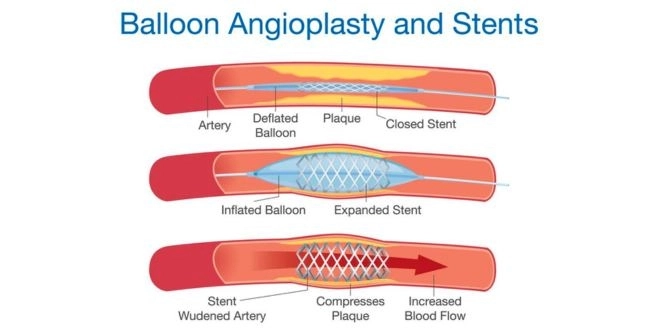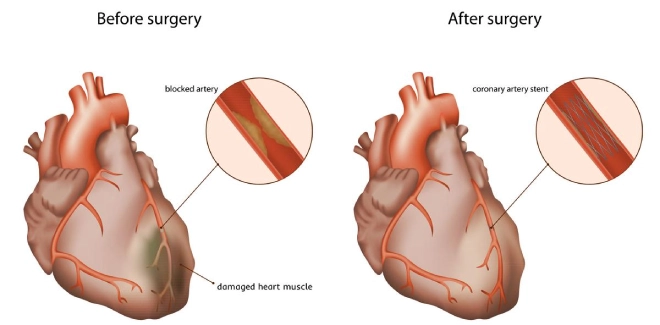Key Differences Between Angioplasty and Heart Bypass Surgery
Even if you have made up your mind, there are still some things you need to consider before making a decision.
If you're a heart patient Considering Angioplasty or Bypass Surgery, it's Important to Understand the Differences.
As a Cardiologist, I'm here to tell you about some of the most notice able differences between these Important Procedures so that you Can make an Informed decision.


-You can Jump On:
What is Angioplasty?
Angioplasty is a minimally invasive procedure used to open up blocked or narrowed arteries.
During the procedure, a thin Catheter with a Balloon is inserted into an artery and threaded up to the area of blockage. The balloon is then inflated to widen the artery and improve Blood flow. A mesh tube Called a Stent Can also be Placed in the Artery During Angioplasty to help keep it open Permanently.

What is Bypass Surgery?
In contrast, bypass surgery involves creating a new pathway around an area of blockage in an artery. This new Route allows Blood to flow freely past any obstructions or restrictions in its original path.
Generally, this requires removing Healthy Tissue from another part of your body and grafting it onto the artery.
Say goodbye to artery obstructions with bypass surgery's innovative solution. Dr. Abhijeet Palshikar, a skilled Angioplasty Surgeon in Pune, paves the way for unobstructed blood flow, utilizing your body's own healthy tissue. Experience renewed Vigor at Cardiomet Clinic.
The Key Differences
The most Obvious Difference Between Angioplasty and Bypass Surgery is their Respective Invasiveness.
Angioplasty requires a catheter to be threaded into your artery, but bypass surgery involves open-heart surgery which can take several hours to complete.
Another key difference is longevity, With Angioplasty, stents are often used to keep arteries open, but these may need replacement or repair in time due to Blockages or Other Complications.
Bypass surgeries are permanent and tend to be more successful in the long term for restoring normal blood flow.

Finally, the recovery time for each procedure can vary significantly.
Patients who undergo angioplasty typically only need to stay in the hospital overnight, while bypass surgery can require a week or more of recovery time.So, "There is no right or wrong answer when it comes to deciding between angioplasty and bypass surgery for treating coronary artery disease. It's important that you have all the facts so that you can make an informed decision with your doctor about which procedure is best for you."
Pros & Cons Of Angioplasty & Bypass surgery
- Angioplasty
- More immediate relief from symptoms
- Shorter recovery time
- Not suitable for all types of blockages
- Risk of complications such as bleeding and stroke
- Often successful in treating complex blockages
- Higher risk of complications than angioplasty
- May not be suitable for some patients due to other medical conditions.
Pros: Less invasive than bypass surgery
Cons: Stents may need to be replaced or repaired in the future
Bypass Surgery
Pros: A more permanent solution to restoring normal blood flow
Cons: Invasive procedure with a longer recovery time
While Angioplasty Can be highly effective, not all patients are suitable candidates due to existing medical conditions. Dr. Abhijeet Palshikar he is Angioplasty Specialist in pune the Angioplasty advises that individuals with certain health issues might need alternative treatments to address their Cardiovascular concerns.
How to do decide which is Best i.e. Angioplasty or Bypass for yourself?
When it comes to deciding between angioplasty and bypass surgery, the best approach is to consult with your doctor.
Your doctor will assess your condition and discuss with you the risks and benefits of each procedure. He or she may also suggest other treatments if they are available.
Ultimately, the Decision is Yours and your Doctor can help guide you in making an informed choice that's Right for you.
Dr. Abhijeet Palshikar at Cardiomet Clinic understands the urgency of certain medical conditions. If immediate attention is necessary, he may advise a specific procedure after carefully evaluating your case. Collaborating with Your Doctor ensures that you receive personalized and appropriate care tailored to your needs.
In Conclusion,
Both Angioplasty and Bypass surgery are effective treatments for coronary artery disease.
The best way to decide which is right for you is to talk with your doctor and consider all the risks and benefits of each procedure.
Depending on your medical history, lifestyle, and overall health goals, either one may be better suited for you than the other. Ultimately, the decision should be made with the help of your doctor.




